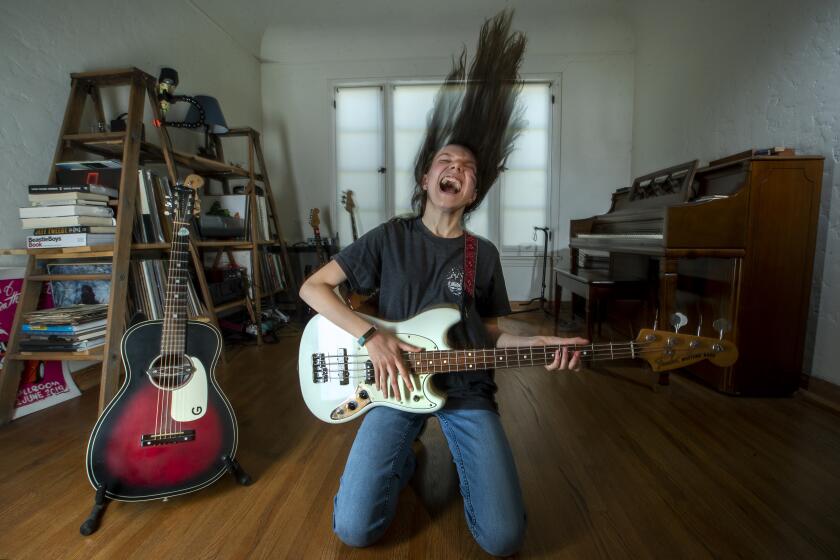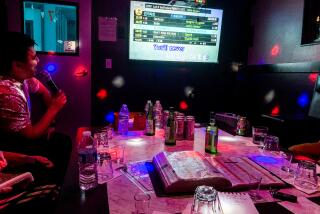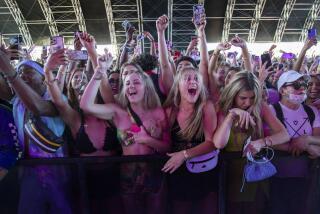L.A. club owners confront fresh new hell: a crashed government website and puzzling reopening rules
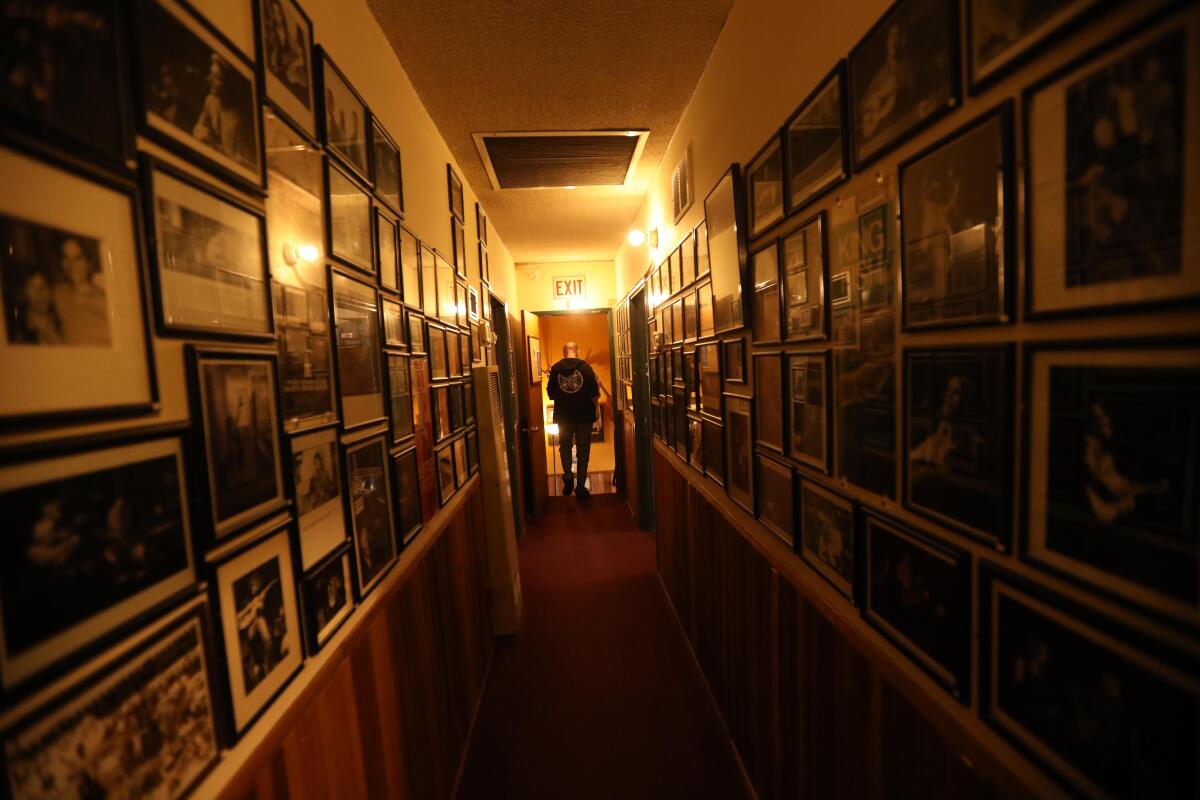
- Share via
Just when federal help seemed imminent for L.A.’s long-suffering music venues, another disaster afflicted the afflicted.
On April 8, the Small Business Administration’s website, through which clubs were set to apply for their life-saving grants, crashed. It’s been down ever since, and it’s left venue owners angry and bewildered.
“I was joking a couple of days later that it felt like a horror film where everyone’s running to the door, getting picked off one by one,” said Kora Peterson, the concert director at the independent folk venue McCabe’s in Santa Monica. “It was salvation we were so desperately hoping for, and it just got pulled out from under us.”
Starting in May, School of Rock students have the option to return to live learning. “I miss playing on stage with my band,” says 12-year-old Daniel.
The bungled rollout of the $16-billion Shuttered Venue Operators Grant, established as part of the Save Our Stages legislation package last year, was the latest gut punch in a year-long saga to get relief to suffering music venues.
Yet as California eyes an economy-wide reopening on June 15, last week, the L.A. County Department of Public Health also released new guidance for events that allows for indoor concerts under strict rules as of April 15.
Some venues are planning to re-hire staff and assess what’s plausible under the new regulations. A push in the California Legislature to create a grant fund for cultural venues might help them move forward, as they wait for the federal government to live up to its promises. Other proposed legislation would tweak or lock in current, loosened regulations on alcohol sales and outdoor service for venues.
“Hopefully the feds can help us address the last 12 months, and we can then ask the state to help with rehiring and reopening,” said Casey Lowdermilk, the assistant general manager of San Francisco’s Bill Graham Civic Auditorium and an organizer for the National Independent Venue Assn.’s California chapter. “We’re really hoping the state can help us push forward now.”
For venue operators, after months of advocacy to pass rescue legislation, to watch their lifeline severed by website trouble seemed beyond belief.
“We definitely understand that it’s a huge lift for SBA to do this, but this was emergency legislation passed on Dec. 27, and it’s now mid-April,” Lowdermilk said. “This can’t come soon enough. Truly, livelihoods are on the line.”
No date is yet set for the SVOG application site to come back online, though the agency said on April 16 that it hopes to restart by “the end of next week.”
Andrea Roebker, a spokesperson for the SBA, said in an email, “The vendors are quickly addressing and mitigating [issues] and working tirelessly with our team so the application portal can reopen ASAP and we can deliver this critical aid. We know this funding is urgently needed now and are doing all we can to reopen with the greatest amount of certainty as possible.”
In the meantime, the Legislature is moving forward with a budget including an aid package that might stanch the bleeding.
On the fifth anniversary of his death, we rank every Prince song officially released as a single, from 1978’s ‘Soft and Wet’ to 2015’s ‘Free Urself.’
In a joint letter to colleagues in February, state Assembly Member Laura Friedman, who represents a swath of L.A. from Burbank to Silver Lake, wrote, “The unfortunate reality is that [federal aid] will not reach enough of our California venues to prevent further shuttering of some of the State’s most iconic independently owned venues. … We strongly encourage you to consider appropriating resources for these venues that have experienced extreme revenue loss, to ensure their doors remain open.”
Last week, state Senate Democratic leaders released a budget plan, “Build Back Boldly,” that would create its own grant program for independent cultural venues. While it didn’t set a specific amount allotted for aid, NIVA California — along with the California Arts Advocates and the California Assn. of Museums — are seeking $1 billion in grants to be disbursed over the next four years. Maryland, Oregon, Illinois and Colorado have already announced similar aid packages.
“We owe them support,” Friedman said. “These venues closed on state orders as many businesses did, and they’ve had a harder time than many others without a stream of income like curbside pickup or delivery. They’re doing the right thing, they’re not part of a corporate chain, they employ people locally and our budget should be a reflection of our values as a state.”
“For venues to survive the impact of COVID-19 after taking on hundreds of thousands in debt, all levels of government have to step up,” Lowdermilk said. “We’re making progress, and I think there’s going to be a huge return if it passes.”
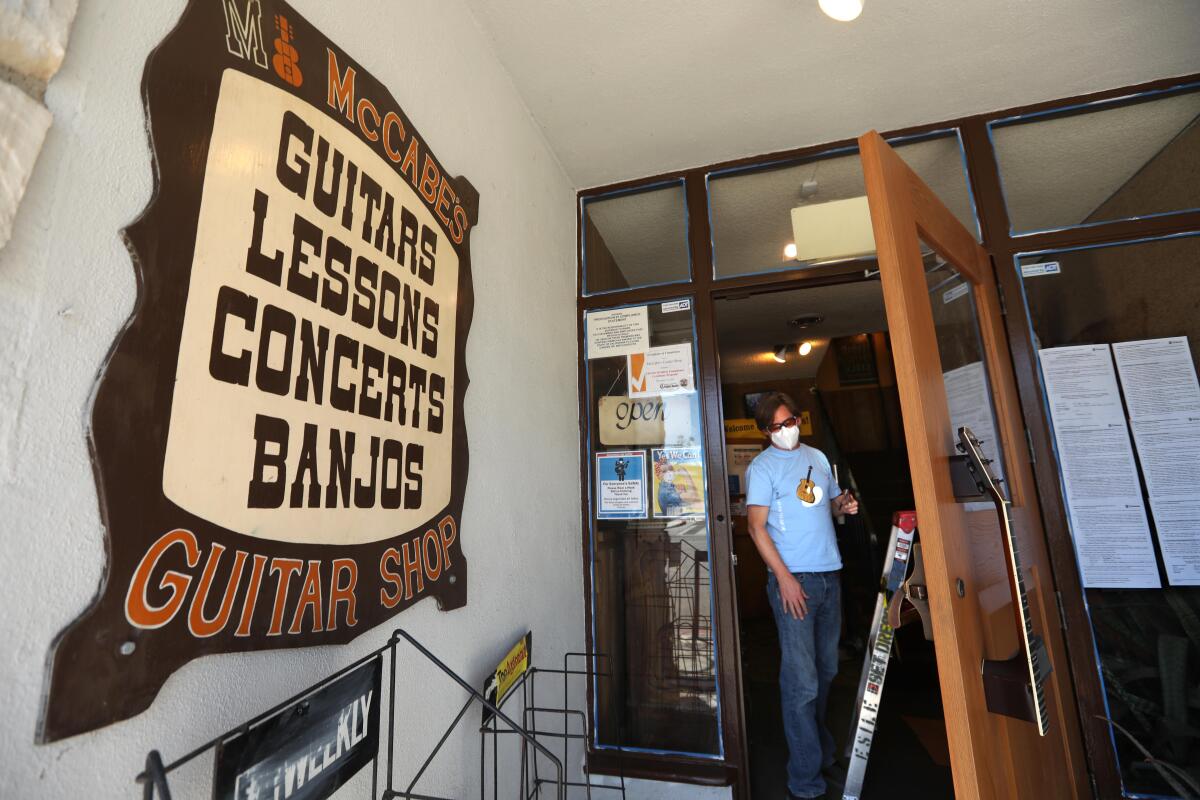
As L.A. venues wait for any aid that’s coming, they face a mix of hope and worries with the opportunity to return to holding concerts.
On April 15, the L.A. County Department of Public Health released a new set of guidelines for indoor concert venues that would permit shows, with a complex array of regulations. They include strict capacity limits depending on venue size and proof of vaccination or recent negative tests from attendees; seating spaced from the stage with separate sections for eating and drinking, and for vaccinated and non-vaccinated guests; and submitting applications 14 days in advance of any planned show. Outdoor venues like the Greek Theatre and Hollywood Bowl are resuming shows with looser restrictions.
While any movement to get back to business is welcome, and while acknowledging that live performances come with some of their own distinct COVID-19 transmission risks, some smaller venue operators say the requirements make it impossible for all but the biggest arenas to produce events. Furthermore, the rules seem to allow more leeway for restaurants and bars, which can operate indoors at 50% capacity with fewer restrictions, than those centered on music performances.
“Gov. Newsom is doing it the right way, we’re not Texas,” Lowdermilk said. “We’re following the science, and we’re grateful we’re included in these new guidelines. But we need close to 100% capacity [for reopening] to make sense. Until that comes to fruition, I don’t see a lot of venues doing that.”
Representatives for the L.A. County Department of Public Health did not immediately return answers to questions about the reasoning behind the different rules for music venues.
From Guns N’ Roses to the Go-Go’s, Julien Baker to Bad Bunny, from dance festivals to metal mosh pits, live music is finally, finally back.
One owner of an independent L.A. music venue, who asked for anonymity, was dispirited at their industry’s hurdles compared to other businesses such as restaurants.
“So as soon as someone walks on stage to play flamenco guitar, then it’s 35% capacity, and you can’t eat or drink at your table, and you need negative tests at the door and to separate un-vaccinated people, and move everyone 12 feet from the stage? It’s beyond prohibitive,” they said. “Arenas are the only places that can make money like this, and they’ll survive no matter what.”
Peterson shared many of those concerns and said McCabe’s was not likely to return to concerts until it could more fully reopen.
“It’s incredibly important that we fight to get shows going, but it’s ridiculously difficult,” she said. “For venues like McCabe’s, there’s no way we can operate with a reduced capacity at anything less than 75%.
“It’s very strange that we chose to open restaurants where customers can remove their masks indoors before we opened up museums or music venues,” she continued. “It seems misplaced.”
One silver lining to the reopening might include a pair of bills, from state Sen. Scott Wiener, which would make permanent some of the COVID-19-era relaxed rules on alcohol service, and ease other regulations on independent venues. They would establish more flexible, fee-free permitting for outdoor service, and create a new entertainment-venue-specific type of liquor license. They’re currently moving through committees in the state Legislature.
“I don’t think those laws have been reformed since the ’70s — it’s archaic,” Lowdermilk said. “A lot of measures have been relaxed during COVID-19 and it’s been hugely beneficial. We should make them into law.”
Friedman agreed. “I’ve never seen something so bipartisanly approved-of as when we allowed restaurants to sell liquor to go,” she said. “We’ve seen a lot of antiquated rules that seem to be holdovers from the ’30s. We should remove barriers that keep businesses from adjusting to the new normal.”
Peterson, meanwhile, hopes that there’s still time to make up for the losses.
“I have a 7-year-old daughter, and I remember one night at the venue she walked onto our stage and told me ‘I’ve got to get used to this,’ because she was going to be a performer,” Peterson said. “She’s missing out on the inspiration of knowing music is a desirable, amazing thing. A whole generation is being lost here.”
More to Read
The biggest entertainment stories
Get our big stories about Hollywood, film, television, music, arts, culture and more right in your inbox as soon as they publish.
You may occasionally receive promotional content from the Los Angeles Times.
